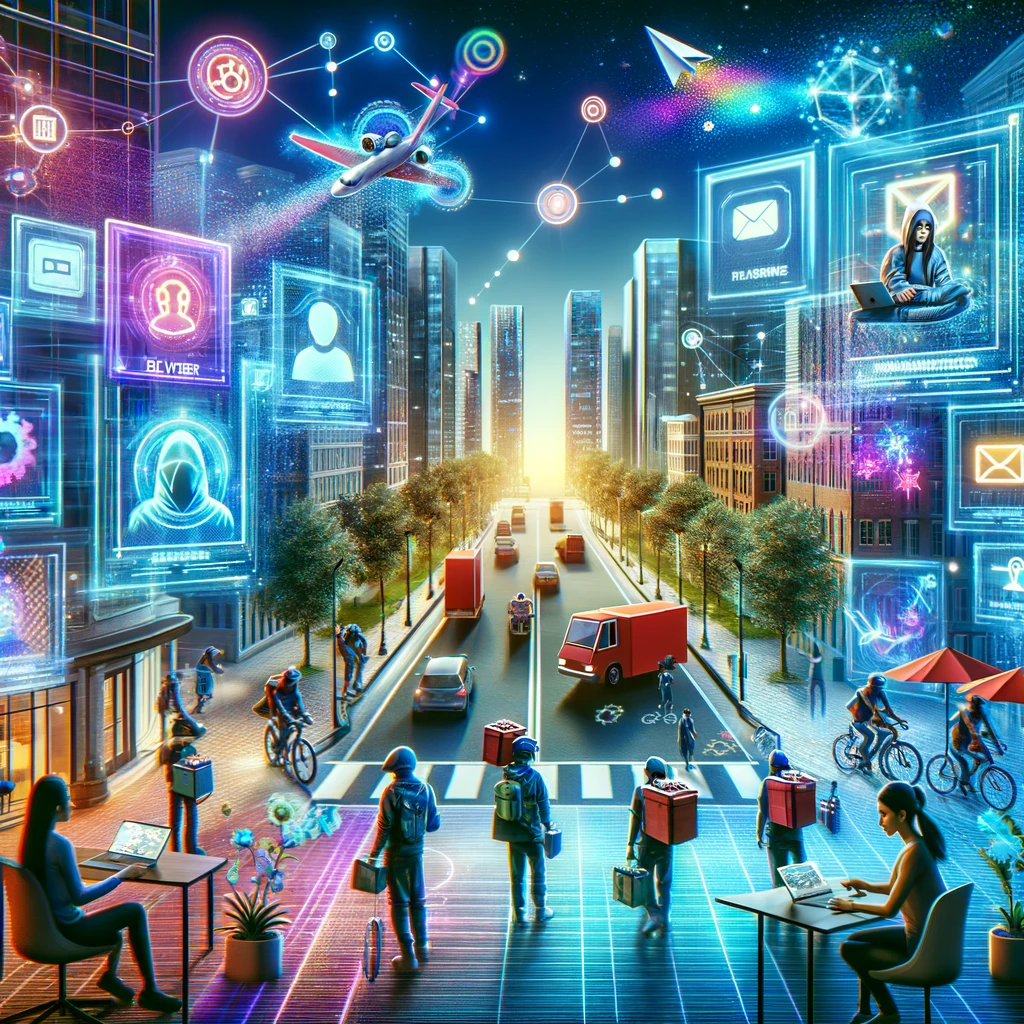The gig economy: exploring the future of work and entrepreneurship
In the digital age, the traditional nine-to-five job is no longer the only path to success. The rise of the gig economy has transformed the way we work, offering unprecedented opportunities for individuals to pursue flexible, independent careers as freelancers, contractors, and entrepreneurs.
At the heart of the gig economy lies the concept of autonomy and flexibility. Instead of being tied to a single employer, gig workers have the freedom to choose when, where, and how they work. This flexibility appeals to a diverse range of individuals, from stay-at-home parents and students to retirees and professionals seeking supplemental income.
The gig economy also presents a fertile ground for entrepreneurship. Platforms like Uber, Airbnb, and Etsy have democratized entrepreneurship, allowing individuals to monetize their skills, hobbies, and assets with minimal barriers to entry. Whether it’s driving for a ridesharing service, renting out spare rooms, or selling handmade crafts online, the gig economy offers a plethora of opportunities for entrepreneurial-minded individuals to generate income and pursue their passions.
However, the gig economy is not without its challenges. Gig workers often lack the benefits and protections afforded to traditional employees, such as healthcare, retirement plans, and job security. Additionally, the rise of automation and algorithmic management raises concerns about job stability and income inequality in the gig economy.
As the gig economy continues to evolve, policymakers, businesses, and workers must collaborate to address these challenges and ensure that the future of work is inclusive, fair, and sustainable. By embracing innovation, fostering collaboration, and prioritizing worker rights and well-being, we can unlock the full potential of the gig economy as a catalyst for economic growth and entrepreneurship in the 21st century.


In the rapidly evolving landscape of technology, blockchain stands out as a revolutionary force, poised to disrupt traditional industries and empower entrepreneurs worldwide. Born out of the digital currency Bitcoin, blockchain technology is far more than just a ledger for cryptocurrency transactions. Its decentralized, immutable nature holds the potential to revolutionize various sectors, from finance and supply chain management to healthcare and beyond.
Blockchain’s decentralized nature eliminates the need for intermediaries, reducing transaction costs and increasing transparency and security. Entrepreneurs are harnessing this technology to create innovative solutions that address real-world challenges, from streamlining cross-border payments to ensuring the authenticity of luxury goods.
By leveraging blockchain, entrepreneurs can access new markets, streamline operations, and foster trust among consumers. The technology’s ability to create tamper-proof records ensures data integrity, offering unprecedented levels of security in an increasingly digitized world.
As blockchain continues to mature, its potential to reshape industries and empower entrepreneurs will only grow. By embracing this revolutionary technology, forward-thinking individuals can drive meaningful change and usher in a new era of innovation and opportunity.

Social entrepreneurship embodies a powerful paradigm shift, where businesses prioritize making a positive impact on society alongside generating profits. Unlike traditional enterprises solely focused on financial gain, social entrepreneurs aim to address pressing social or environmental issues through innovative business models.
At the heart of social entrepreneurship lies the belief that business can be a force for good, tackling systemic challenges such as poverty, inequality, and environmental degradation. By harnessing the power of entrepreneurship, these visionary individuals create sustainable solutions that benefit both people and the planet.
From fair trade enterprises lifting artisans out of poverty to eco-friendly startups reducing carbon emissions, social entrepreneurs are driving tangible change in communities worldwide. Their ventures not only generate economic value but also foster social inclusion, environmental stewardship, and empowerment.
The power of social entrepreneurship lies in its ability to catalyze grassroots movements and inspire collective action. By aligning purpose with profit, social entrepreneurs are proving that business can be a vehicle for positive social change, creating a more equitable and sustainable world for future generations.

Uncertainty is an inevitable part of the entrepreneurial journey, and crises often amplify these challenges. However, history has shown us that amidst chaos and disruption, there are entrepreneurs who not only survive but thrive. Their stories offer valuable lessons on resilience, adaptability, and seizing opportunities in the face of uncertainty.
One key lesson from these entrepreneurs is the importance of agility and flexibility. In times of crisis, rigid business models and strategies may no longer be viable. Successful entrepreneurs pivot quickly, embracing change and exploring new avenues to sustain their businesses.
Another crucial aspect is maintaining a focus on customer needs and market dynamics. Entrepreneurs who thrive in crises are adept at identifying emerging trends and adapting their offerings to meet evolving demands. By staying closely attuned to their customers, they can anticipate shifts in preferences and tailor their products or services accordingly.
Moreover, building strong networks and partnerships can provide invaluable support during turbulent times. Collaborating with like-minded entrepreneurs, industry experts, and community leaders can offer access to resources, expertise, and emotional support, helping entrepreneurs navigate challenges more effectively.
Above all, resilience and a growth mindset are essential qualities that distinguish thriving entrepreneurs. They view crises as opportunities for innovation and growth, rather than insurmountable obstacles. By embracing uncertainty as a catalyst for change, these entrepreneurs emerge stronger, more agile, and better positioned to seize opportunities in the ever-changing business landscape.

In the digital age, the traditional nine-to-five job is no longer the only path to success. The rise of the gig economy has transformed the way we work, offering unprecedented opportunities for individuals to pursue flexible, independent careers as freelancers, contractors, and entrepreneurs.
At the heart of the gig economy lies the concept of autonomy and flexibility. Instead of being tied to a single employer, gig workers have the freedom to choose when, where, and how they work. This flexibility appeals to a diverse range of individuals, from stay-at-home parents and students to retirees and professionals seeking supplemental income.
The gig economy also presents a fertile ground for entrepreneurship. Platforms like Uber, Airbnb, and Etsy have democratized entrepreneurship, allowing individuals to monetize their skills, hobbies, and assets with minimal barriers to entry. Whether it’s driving for a ridesharing service, renting out spare rooms, or selling handmade crafts online, the gig economy offers a plethora of opportunities for entrepreneurial-minded individuals to generate income and pursue their passions.
However, the gig economy is not without its challenges. Gig workers often lack the benefits and protections afforded to traditional employees, such as healthcare, retirement plans, and job security. Additionally, the rise of automation and algorithmic management raises concerns about job stability and income inequality in the gig economy.
As the gig economy continues to evolve, policymakers, businesses, and workers must collaborate to address these challenges and ensure that the future of work is inclusive, fair, and sustainable. By embracing innovation, fostering collaboration, and prioritizing worker rights and well-being, we can unlock the full potential of the gig economy as a catalyst for economic growth and entrepreneurship in the 21st century.

In the face of escalating environmental challenges, green entrepreneurship has emerged as a powerful force for positive change, driving innovation and sustainability in business. From renewable energy startups to eco-friendly product companies, green entrepreneurs are pioneering solutions to mitigate climate change, reduce resource consumption, and promote environmental stewardship.
At the core of green entrepreneurship is a commitment to sustainability and social responsibility. These visionary entrepreneurs recognize the urgent need to transition towards a more sustainable economy, and they are leading by example through their innovative business models and practices.
One key area of focus for green entrepreneurs is renewable energy. With the global shift towards clean energy sources, startups specializing in solar, wind, and hydro power are playing a crucial role in accelerating the transition to a low-carbon future. By harnessing renewable energy technologies, these entrepreneurs are not only reducing greenhouse gas emissions but also creating new job opportunities and driving economic growth.
Another important aspect of green entrepreneurship is the development of sustainable products and services. From biodegradable packaging to organic food production, green entrepreneurs are reimagining traditional industries to minimize their environmental footprint. By prioritizing eco-friendly materials, production processes, and distribution channels, these businesses are setting new standards for sustainability in the marketplace.
Moreover, green entrepreneurship extends beyond environmental considerations to encompass social and economic dimensions as well. Many green startups prioritize fair labor practices, community engagement, and equitable access to resources, ensuring that their business practices align with principles of social justice and inclusivity.
As consumers increasingly demand environmentally responsible products and services, green entrepreneurship is poised to reshape industries and drive systemic change. By fostering collaboration, innovation, and a shared commitment to sustainability, green entrepreneurs are paving the way towards a more resilient, equitable, and sustainable future for all.

The journey from startup to unicorn – a privately held company valued at over $1 billion – is one of the most coveted achievements in the entrepreneurial world. Yet, behind the allure of billion-dollar valuations lies a complex and often unpredictable path marked by challenges, triumphs, and strategic decision-making.
At the outset, startups face numerous hurdles, from securing funding and building a talented team to refining their product or service and finding product-market fit. Successful entrepreneurs navigate these early-stage challenges with resilience, adaptability, and a relentless focus on their vision.
As startups gain traction and scale, strategic decision-making becomes increasingly critical. Whether it’s expanding into new markets, forging strategic partnerships, or navigating regulatory hurdles, entrepreneurs must make informed decisions that position their company for sustained growth and success.
One key factor contributing to the success of billion-dollar companies is their ability to harness technology and innovation to disrupt traditional industries. Whether it’s leveraging AI and machine learning to enhance product offerings or utilizing blockchain to streamline operations, unicorns are at the forefront of technological innovation, driving transformative change in their respective sectors.
Moreover, the journey to unicorn status is not without its share of risks and setbacks. Economic downturns, regulatory challenges, and fierce competition can all threaten the viability of even the most promising startups. Successful entrepreneurs mitigate these risks by staying agile, continuously iterating on their business model, and maintaining a long-term perspective.
Ultimately, the journey from startup to unicorn is a testament to the power of vision, perseverance, and strategic execution. While the path may be fraught with challenges, the rewards – both financial and intrinsic – can be immense. By decoding the journey of billion-dollar companies, aspiring entrepreneurs can glean valuable insights and inspiration as they embark on their own entrepreneurial endeavors.
Kitap hakkında yorumlar


